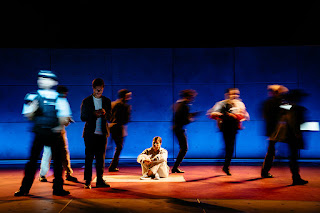The nature of these deaths would make the family drama public in any circumstances, but it's made more so because of who the family are: Their uncle Creon (Tony Jayawardena,) previously the Home Secretary, has just been elected Prime Minister.
In a bid to please his hardline supporters and appear tough on crime, he orders that the policeman nephew be given a hero's funeral, but that the terrorist be made stateless, and left unburied until another state claims him. As a Muslim family, even a delay in the funeral rites is against their religion, never mind the prospect of his remaining unburied indefinitely, and Antigone goes up against the power of her uncle, and the State he represents, in an attempt to give her brother the send-off their faith demands. In the process she becomes a figurehead to the dispossessed her uncle's regime is leaving out in the cold.
The fact that Ellams' rewrite is a radical one can be seen from the running time alone: Including interval, it comes in at about an hour longer than most Greek tragedies. Unfortunately it's in these additions that his version is least convincing, as he goes out of his way to make the play topical almost to the second. So we have a specific Government attack on the Human Rights Act; an Asian politician who feels the need to be even more Islamophobic than the rest to prove himself to the hard Right; a Cummings-like spin doctor (Sandy Grierson,) who's even called Aleksy as a nod to Russian influence on Government; a Downing Street party when the rest of the nation's in a State of Emergency; and an election where it's repeatedly noted that none of the potential new PMs are up to the job. It's a lot, and starts to look like Ellams doesn't trust the audience to connect the dots*.
And while I can understand the desire to set up the characters' motivations I'm not sure that quite comes off either. With the original story changed we need a new background to Polyneices that makes him more sympathetic, but it's quite clumsily shoehorned in. And I don't think we needed all the emphasis on Antigone's earlier social work, her actions and speeches standing up to Creon let us know who she is.
There are, however, a few new flourishes that really work - the gender-swapping prophet Tiresius (Eli London) becoming a non-binary information expert who exposes how Aleksy's been manipulating the polling data is a neat touch. So is expanding the role of Antigone's fiancé Haemon (Oliver Johnstone,) who turns up like an afterthought in the Sophocles version. Here we get to see his relationship with Antigone as something much more real than the arranged political marriage of the original†. (Here he's Creon's step-son, also removing the incestuous element of the relationship.) And Pandora Colin's Euridice getting to mobilise the female party donors against her husband's policies is an interesting way of giving her more agency than Sophocles allows her.
And the parts of the story that come directly from the original are very well-handled, both by Ellams' text and Max Webster's dynamic production. Particularly interesting is the use of the Chorus - unlike traditional Ancient Greek Theatre this isn't a single group of people throughout, but the ensemble taking on various roles (mostly the public who support Antigone, but police and politicians appear at times as well) to commentate on the action. What is traditional is the use of dance and song to convey these Chorus scenes - although Michael 'Mikey J' Asante's old-school hip-hop style probably isn't quite what you'd have got at Epidaurus. The Chorus interjections range from the electric to the slightly awkward, so it isn't a 100% success, but it's definitely an interesting way of recreating a major element of the genre that modern productions aren't always sure what to do with.
I'm not in favour of being too respectful to Greek Tragedy's conventions - its hard and fast "tell, don't show" rule goes against what I like to see in theatrical storytelling, and of course a modern audience isn't expected to come in with an encyclopaedic knowledge of the context, so some expansion is needed. Ellams has perhaps erred a bit too much in the opposite direction, adding more detail than is strictly necessary which detracts from the emotional punch, and the short, sharp shock of a pared-down story. But if it takes too long to get to the point it's still an interesting watch when it gets there, and some of the twists and tweaks are definitely welcome.
Antigone by Inua Ellams after Sophocles is booking until the 24th of September at the Regent's Park Open Air Theatre.
Running time: 2 hours 35 minutes including interval.
Photo credit: Helen Murray.
*ironically, all Ellams needed to do to make it topical right up to the minute would have been to change nothing from the original, then it would have been a story about figuring out what to do with a dead Royal
†SPOILER ALERT: Given that he's also one of the major tragic deaths at the end, it doesn't hurt for the audience to have the chance to give a shit about him either







No comments:
Post a Comment